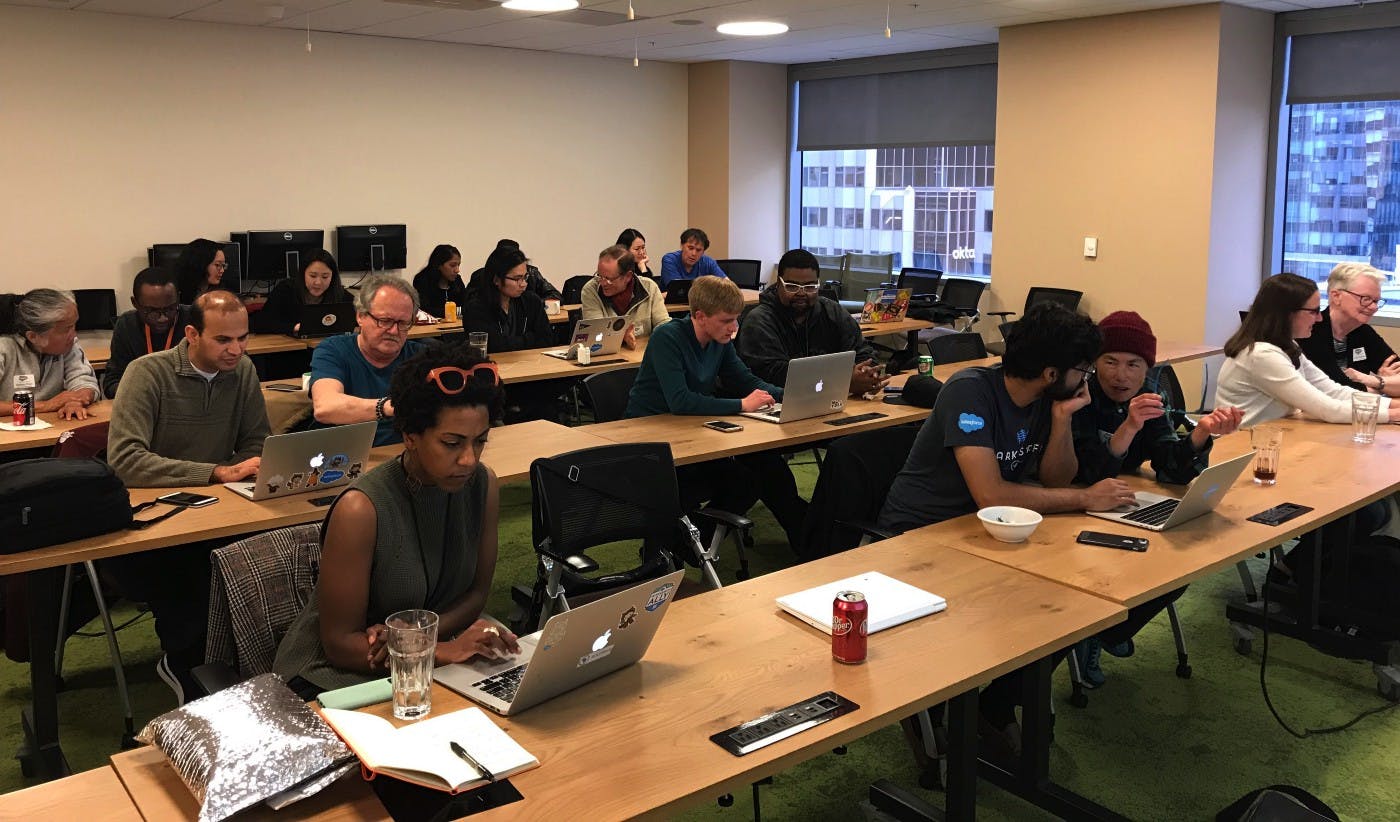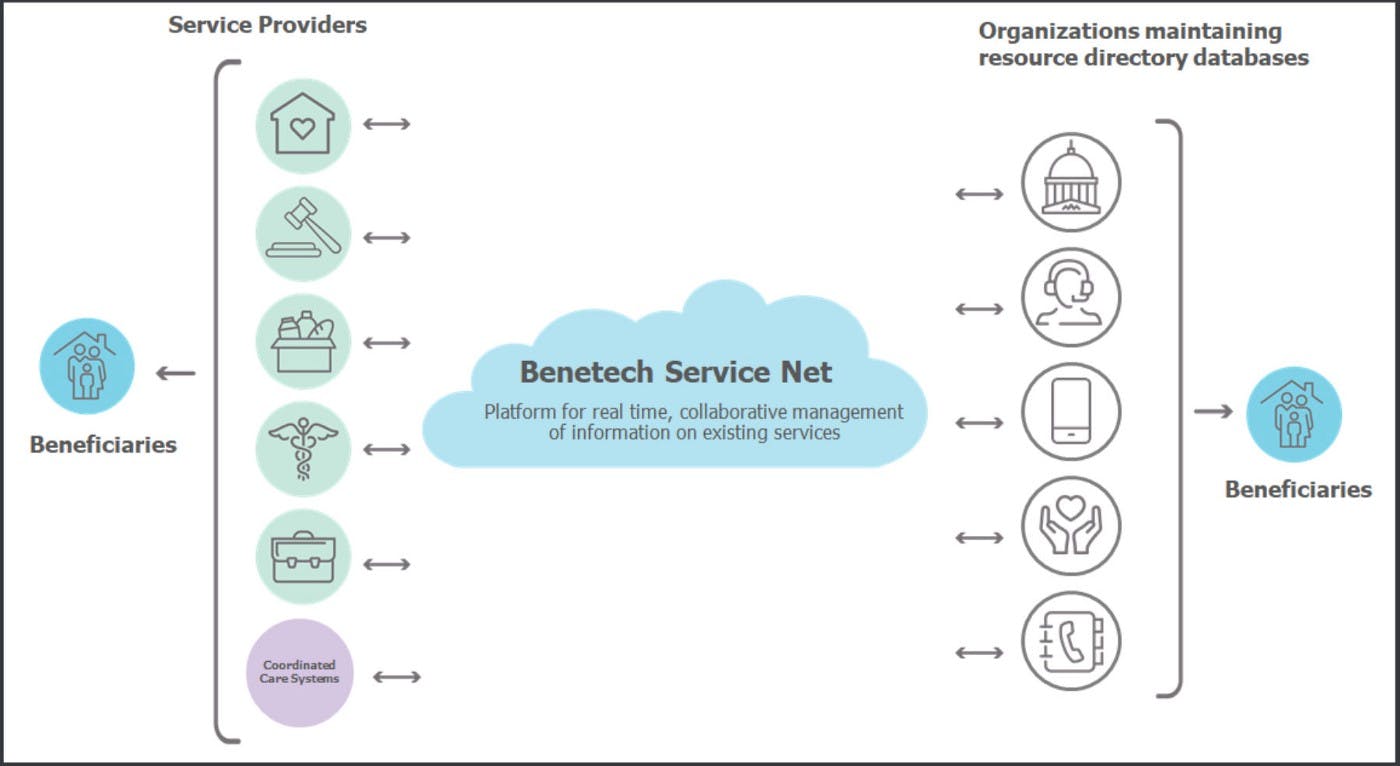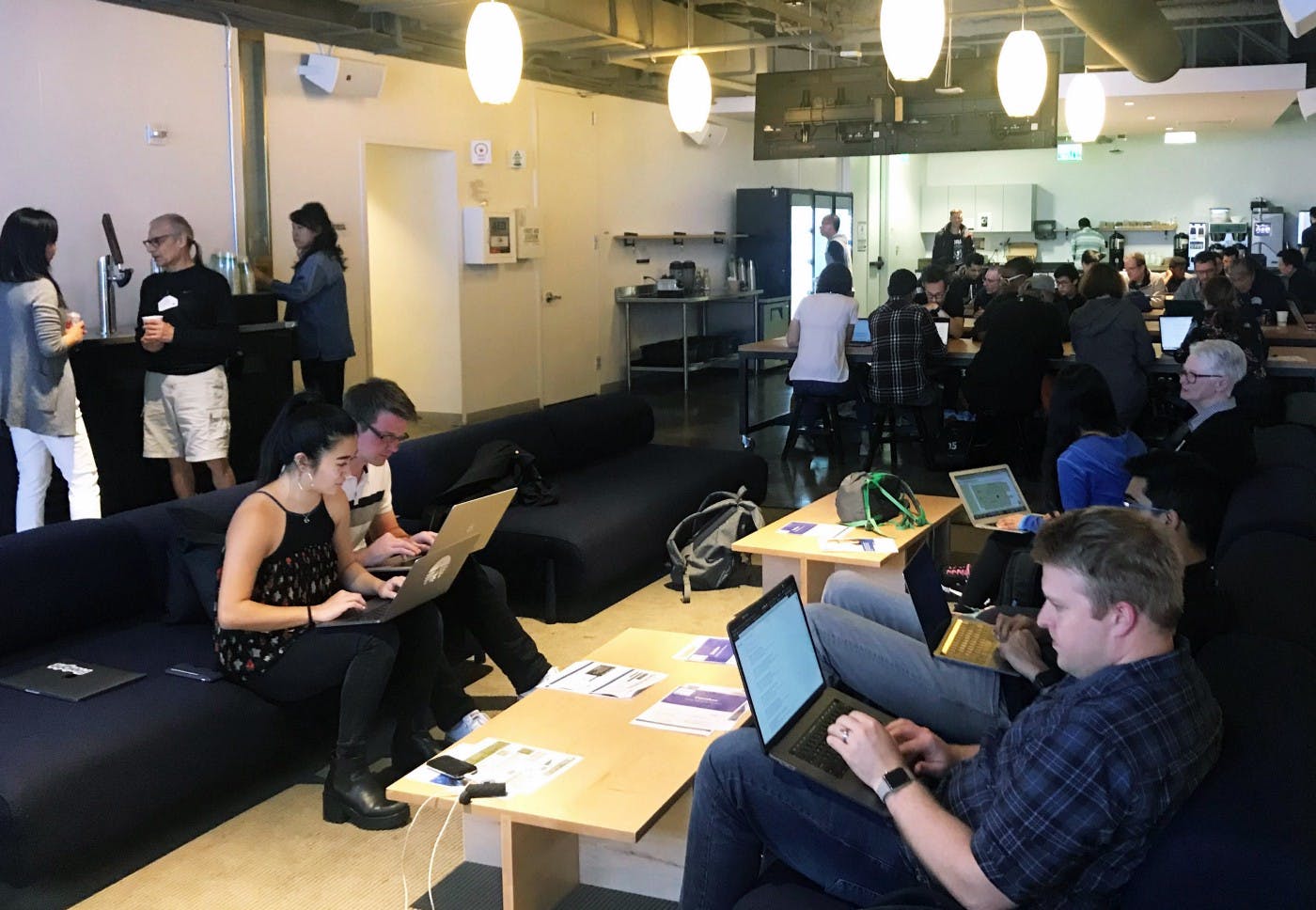Stories

Since its founding twenty years ago, Salesforce has committed to giving back to its community. The company pioneered the 1–1–1 model[1], which “dedicates 1% of Salesforce’s equity, 1% of Salesforce’s product and 1% of Salesforce employees’ time back to communities around the world.” The third 1% is the driving factor behind Salesforce’s employees taking “volunteering time off” (VTO) to become stakeholders in their respective communities. Especially in San Francisco, one significant challenge that volunteers are tackling is leveraging technology solutions to help empower the community around issues of homelessness and poverty. ShelterTech is one such organization tackling this issue. We are a San Francisco-based nonprofit comprised entirely of volunteers, and we aim to solve the biggest technology challenges faced by those experiencing homelessness. Salesforce and ShelterTech both understand and value the transformative power and responsibility of using technology for good, and some Salesforce employees also regularly volunteer at ShelterTech and have worked on other programs such as ShelterConnect (a free wifi service installed at shelters and transitional housing centers) and Casey (a case management self-service solution that guides at-risk individuals through common problems associated with homelessness). Salesforce also actively participates in other initiatives as well. Faithforce, a Salesforce employee-led and employee-organized Ohana group[2], has had volunteers work at City Impact and other shelters, and has also been closely aligned with ShelterTech this year to reach out to these communities. Marc and Lynne Benioff have also donated $30 million to launch the UCSF Benioff Homelessness and Housing Initiative[3], which will start efforts to work with organizations in San Francisco to help underserved communities. An Ambitious Endeavor With over 1,700 services, 360 organizations, and 200 categories, AskDarcel is the definitive platform of homeless resources and services for case managers and the communities that they support. To make sure that the data is maintained and up to date, ShelterTech hosts periodic public workshop events called “datathons” that bring together volunteers from organizations and the community at large to help update the information for these resources on the website. These volunteers work alongside community representatives (CRs) who are either currently homeless, or have previously been homeless to research and make improvements such as validating phone numbers, verifying a resource’s website description, correcting a resource’s address and location, and fixing broken links are some of the tasks that take place. To date, over 200 volunteers have helped support this effort. One Ohana Recently, we hosted a datathon with 16 Salesforce employees, held at Salesforce’s San Francisco headquarters. The event was well received, and these volunteers were able to discover a different, first-hand perspective of San Francisco’s homelessness challenge. At the datathon, we spoke with Julia Kim, a Salesforce employee to learn about her background in volunteering for various causes and her views on homelessness. Julia previously volunteered at a number of nonprofit organizations, including most recently at an eco-agriculture farm in Costa Rica focused on environment conservation efforts. She participated in the datathon because she resonated with ShelterTech’s mission to make an impact on the perpetual problem of homelessness in San Francisco using technology as a driving force for change. Through partnering with Marilyn, a community representative who regularly works with ShelterTech, she learned about the Obama phone program[4] which has helped 20 million financially-strapped Americans get a free cell phone and minutes and enables them to access to ShelterTech services. In a reflection of current economic hardships across the United States, Julia remarked that there is a striking difference in the accessibility to shelters for the homeless community in New York compared to San Francisco. Through the datathon, she was surprised to learn the number of resources available to the homeless community in San Francisco and saw the value in the services ShelterTech provides to connect those who are homeless in San Francisco to available shelters. For this reason, Julia supports solutions such as AskDarcel.org and was happy to have worked with Marilyn, on updating contact data on the website. A Call to Action Despite tech companies contributing to San Francisco’s strong economic growth over the past 20 years, the combination of rising housing costs and home availability shortages has led to a continuous increase of poverty and homelessness. A report[5] from the office of San Francisco Mayor London Breed showed that from 2017 to 2018, the city saw a 17% increase of homeless individuals from 6,858 to 8,011. In our mission to meet the needs of individuals experiencing homelessness, ShelterTech and AskDarcel thrive on the kindness and support of our volunteers. If you’re interested in volunteering or have your organization partner with us in an upcoming Datathon, send us an email at [email protected]. Finally, it takes a village to keep the lights on at ShelterTech. Did you know that Community Representatives are compensated for their time working with volunteers at a Datathon? If you might be able to help us raise $500 to cover the costs of our next Datathon, please Donate here. *The views expressed in this article are solely of the volunteers’, and not representative of Salesforce as a whole. References: 1: https://www.salesforce.com/company/ventures/pledge1/ 2: https://www.salesforce.com/company/equality/ohanas/#eq-sf-fh 3: https://www.salesforce.com/company/news-press/stories/2019/05/050119-e/ 4: https://www.obamaphone.com/ 5: https://sfmayor.org/article/mayor-breed-announces-new-homelessness-prevention-funding-city-releases-initial-homelessness

The question of how to make life easier, better and more humane for those experiencing poverty and homelessness is, in many ways, huge and overwhelming. It is a problem for which few people want to take responsibility — an issue which feels like it should be everyone else’s to deal with. Our work at ShelterTech aims to play a part in answering that question and take a little bit of that responsibility. We leverage the specific skill sets of our creative and committed volunteers in ways which directly help the people who need it most. We have spent more than three years listening to and hearing from people with lived experience of homelessness to develop the most useful, targeted and impactful technology tools possible for them. So far, we have wired 10 shelters and supportive housing facilities with WiFi and created step-by-step paper guides to help guide people through through the most confusing, scary parts of being transitionally homeless, as well as developed a digital directory of human services and resources in the City of San Francisco. No one organization can expect to do this kind of work alone. Over the past three years, we have understood that all our best, most significant work is done by building upon the work done by other organizations also aiming to push forward change for those experiencing poverty and homelessness. It has become increasingly clear to us that we are but a small part of a beating heart of an ecosystem with a common goal: to lift up the voices of the underserved and build technological solutions that work for them. This is why ShelterTech has fully committed to an open-source, collaborative approach in everything we do. Working with other organizations also aiming to help bridge the digital divide can only serve to improve our collective impact in the long term. With collaboration being such an integral part of what we do, we are so excited to be part of Benetech’s Service Net pilot in the Bay Area. This first of its kind data collaboration initiative will allow us to work alongside other ServiceNet partner organizations to share the resource directory data that we have developed and honed throughout the years to one central platform, sharing the load of data maintenance and updates while also enriching each other’s datasets and knowledge of the local safety net. Using the ServiceNet hub will increase the quality and accuracy of our organization’s database while also reducing the cost and duplication of efforts that go into maintaining these records separately. Accuracy is clearly key to these types of databases. Consider the impact that incorrect or inaccurate information may have on a person experiencing homelessness. They may go to a shelter they thought was available seeking a comfortable night’s rest, only to find it closed or full. For them, that means another night of fear and instability. Another night without a roof over their head or a bed to lay on. How likely are they to use our platform again? Or even try to access services? What better way to avoid these kinds of errors than to engage in a group effort? The hub will aggregate our data with that of the other ServiceNet pilot program participants, allowing us to view other organizations’ records and updates and giving us access to information we may be missing. Given the enormous operational burden involved in maintaining an accurate up-to-date directory of services, this is an invaluable system of cooperation, which will not only improve the overall wealth of specific and precise information available to people experiencing homelessness, but will also allow each individual ServiceNet partner organization to perform at maximum efficiency, thereby making the biggest change possible, both together and individually. The combined effort of everyone involved in the pilot program and the information we are able to gather as a result will also help Benetech expand their initiatives beyond the Bay Area and help even more people. Benetech’s ServiceNet initiative underlines that building technology cannot be done in a vacuum and that, despite our important work as an individual organization, we are worth even more when part of a collective. Our main priority is always the human lives that we can be instrumental in changing, and the ways in which we can have the biggest impact on them. Being part of programs like this one encourages us to remember that and keep it at the very center of what we do. Learn more about the ServiceNet pilot program here.

People experiencing homelessness often feel alone. While most of us have family and friends to tide us through obstacles in life, people without support networks find themselves enduring personal struggles on their own, such as eviction or a job loss. This sentiment is echoed by Aaron, a Milwaukee native who experienced 15 years of homelessness, “Life suddenly turned upside down when my first wife died and it got even worse when my second wife divorced me.”. How can ShelterTech step in to support individuals experiencing homelessness by connecting them to resources that provide holistic support? On 8 and 9 April 2019, ShelterTech partnered with Uber employees in a Datathon to improve San Francisco’s largest housing and human services directory, AskDarcel.org. AskDarcel.org features an extensive library of resources, across 6 different categories which are ‘Basic Needs and Shelter’, ‘Eviction Prevention’, ‘Health and Medical’, ‘Housing’, ‘Legal’ and ‘Employment’. Designed to help homeless individuals meet their every need, it can be challenging to gather and collate resources from all over the internet. As such, AskDarcel.org relies on the help of its volunteers to improve and update information about resources on the website. Through partnering with our Community Representatives (CRs) — people who have experienced homelessness — Uber employees vetted a total of 70 resource pages on 8 and 9 April. The Datathons began with long lists of resource pages that had to be worked on, alongside suggestions on what could be improved about them. Examples of these suggestions included shortening the resources’ descriptions, distributing information in appropriate fields, and removing jargon to make content reader-friendly. This is when working with a CR is particularly useful, as a formerly homeless individual could suggest language that’s more familiar to the community, or shorthand references that certain resources are more commonly known by. We learned from chatting with Uber employees that their experience volunteering with us was meaningful and special. Hunter Gray, who worked with CR Marilyn Chan, expresses that the Datathon was “an incredible experience”. He says,“I was able to learn far more about the amount of thought and work that goes into building into a resource like AskDarcel and I am incredibly impressed by the group of community volunteers to come together and want to help the community in this way.”. Hunter and Marilyn collaborated to shorten the description of the Bayview Hunter’s Point Multipurpose Senior Services, which provides housing advocacy services and nutritious meals to seniors and people with disabilities. Of the 70 resources vetted by the volunteers, 20 provide healthcare services, 12 resources help homeless individuals legally advocate for themselves, and 7 support case management efforts. Some resource pages required the determination of Uber employees and ShelterTech CRs to work through, such as the Violence Intervention Program which had multiple issues with formatting and content before their help. Sam, an Uber employee, partnered with CR Aaron to edit this resource, which provides important social services like mental health programs and job training in the Tenderloin district. Sam’s greatest takeaway was that there are “a lot of resources out there”, and that he had “never volunteered for an organization like {ShelterTech}”. Another Uber employee agreed that working with ShelterTech had been eye-opening: “It’s amazing to know there are resources out there to help solve the homelessness issue, and it’s good to know there is an organization to put them together!”. Beyond contributing to AskDarcel.org, some Uber employees have also developed a more nuanced idea of homelessness as something that can often be transitional, rather than always chronic. Through working closely with individuals who have formerly experienced homelessness, they feel empowered to help tackle this immense issue. Hunter mentions that there is “misinformation” and “a mischaracterization of the population of people who are experiencing homelessness” as chronically homeless in San Francisco, stressing that transitionally homeless individuals should be supported through their hardships without shelter. As well as partnering with ShelterTech, Uber has worked closely with other human services organizations to provide support to individuals experiencing homelessness. A spirited team of 14 Uber employees spent an afternoon at the Larkin Street Youth Services Center and assembled 100 Hygiene Kits for homeless youth, along with personalized cards and messages. Larkin Street Youth Services provides comprehensive services that meet young people’s needs, while encouraging them to access our services when and how they feel comfortable. This helps young people take charge of their own lives, developing long-lasting self-sufficiency while building trust in themselves and our staff. Uber has also expressed an interest to partner with ShelterTech to action suggestions to improve our Datathon events’ efficiency. Through working closely with corporations like Uber, ShelterTech is thrilled to harness the power of technology within its San Francisco network to connect the homeless to helpful resources! In our mission to meet the needs of individuals experiencing homelessness, ShelterTech and AskDarcel thrive on the kindness and support of our volunteers. If you’re interested in volunteering or have your organization partner with us in an upcoming Datathon, send us an email at [email protected]. Finally, it takes a village to keep the lights on at ShelterTech. Did you know that Community Representatives are compensated for their time working with volunteers at a Datathon? If you might be able to help us raise $500 to cover the costs of our next Datathon, please Donate here. Any amount helps. *The views expressed in this article are solely of the volunteers’, and not representative of Uber as a whole. Edited by Michael Polce, Ivan Hartanto and Vix Jensen with special thanks to Justine Nguyen of Uber.